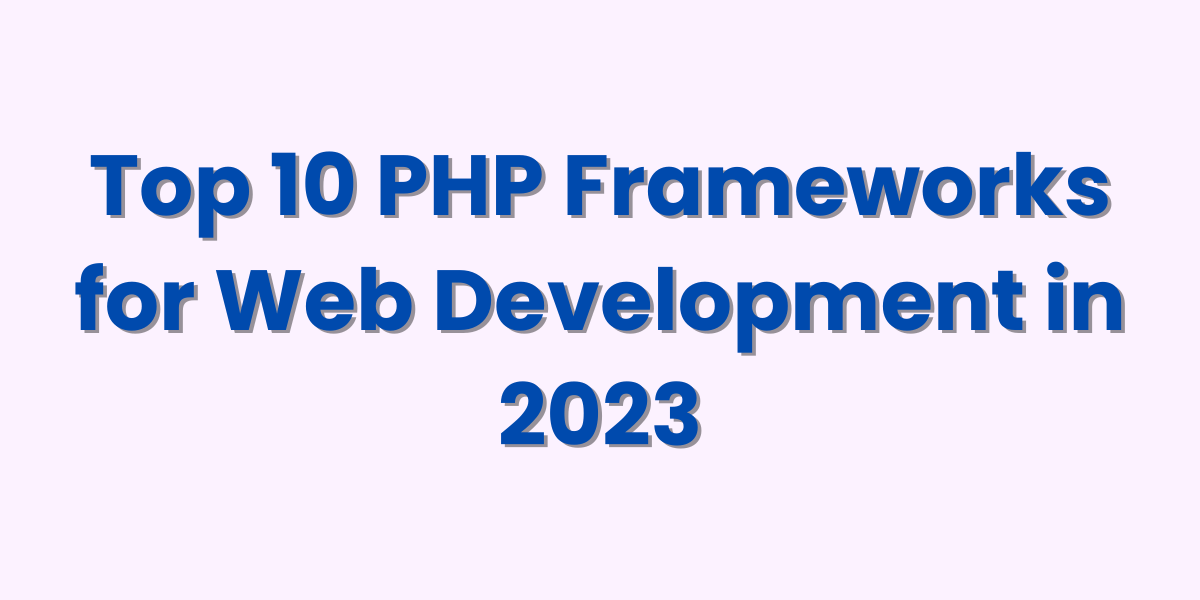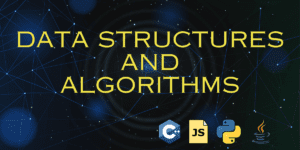PHP (Hypertext Preprocessor) is a popular server-side scripting language for web development, and there are several frameworks available that make PHP web development more efficient and organized. We will be discussing some of the top 10 PHP frameworks for web development on this topic.
What is a PHP Framework?
A PHP framework is a pre-built, structured, and reusable set of tools, libraries, and best practices designed to simplify and expedite the development of web applications and websites using the PHP programming language. These frameworks provide a foundation for developers to work on, offering a structured way to build applications while reducing the need to write repetitive code from scratch.
Here are some key components and concepts commonly found in PHP frameworks:
MVC Architecture
Most PHP frameworks follow the Model-View-Controller (MVC) architectural pattern. This separation of concerns helps organize code into three main components:
Model: Represents the application’s data and business logic.
View: Handles the presentation and user interface.
Controller: Manages the data flow between the Model and View, handling user input and controlling application behavior.
Routing:
Frameworks often include a routing system that maps URLs to specific controllers and actions, making it easier to handle different requests and route them to the appropriate code.
Database Abstraction:
PHP frameworks usually offer built-in support for database interaction, making it simpler to perform common database operations using Object-Relational Mapping (ORM) or other database abstraction techniques.
Template Engine:
Many frameworks come with a template engine that separates HTML markup from application logic, making it easier to create dynamic and maintainable views.
Authentication and Authorization:
Frameworks often provide mechanisms for user authentication and role-based access control to secure web applications.
Validation and Form Handling:
They include tools for form validation and handling user input, helping developers ensure data integrity and security.
Middleware:
Middleware components allow developers to add pre-processing or post-processing logic to HTTP requests and responses, enhancing the flexibility of the application.
Error Handling:
PHP frameworks typically offer error handling and logging capabilities to make it easier to identify and troubleshoot issues.
Security Features:
Security is a significant concern in web development, and frameworks often incorporate built-in security measures, such as protection against common web vulnerabilities like cross-site scripting (XSS) and SQL injection.
Community and Ecosystem:
Frameworks benefit from active developer communities and ecosystems of third-party libraries and extensions, which can save development time and provide additional functionality.
Popular PHP frameworks, like Laravel, Symfony, CodeIgniter, and Yii, have gained widespread adoption due to their feature sets, documentation, and active communities. Choosing the right PHP framework depends on your project’s specific needs and goals, as well as your familiarity with the framework’s conventions and practices. Using a framework can significantly streamline the development process and improve code quality and maintainability.
Top 10 PHP Frameworks for Web Development in 2023
Laravel
Laravel is one of the most popular PHP frameworks. It follows the MVC (Model-View-Controller) pattern and provides features like a powerful ORM, routing, authentication, and a rich ecosystem of packages.
Features of Laravel include:
- Artisan commands: Artisan is a command line interface that comes bundled with Laravel. It allows you to perform common tasks such as database migrations, database seeding, and package installation.
- Blade templates: Laravel includes a templating system called Blade. The blade allows you to write plain PHP code in your views, but it also provides convenient shortcuts for common tasks such as displaying data, creating forms, and paginating records.
- Routing and controllers: Laravel provides an easy and intuitive way to define routes in your application. Routing allows you to map URLs to specific actions, such as displaying a view, making an API call, or sending an email.
- Eloquent ORM: Eloquent is Laravel’s built-in Object Relational Mapper (ORM). It provides an easy way to define relationships between models and allows you to perform database operations in an object-oriented manner.
- Security: Laravel includes several security features such as input validation, password hashing, and user authentication.
Symfony
Symfony is a highly customizable PHP framework known for its modularity and scalability. It offers a wide range of components and tools that can be used independently. Symfony is widely used for building web applications, including content management systems, e-commerce platforms, and custom web applications. It is a versatile framework suitable for both small and large-scale projects.
Features of Symfony include:
- Bundle System: Symfony applications are organized into bundles, which are reusable and shareable sets of code. Bundles allow you to encapsulate features and functionality, making it easier to manage your application’s components.
- Dependency Injection: Symfony uses a robust dependency injection container to manage and inject the dependencies of your application. This makes it easy to manage and test your code, as well as promoting loose coupling between components.
- Templating Engine: Symfony provides a powerful templating engine called Twig, which offers a clean and secure way to create HTML templates. Twig supports template inheritance, macros, and filters, making it easy to create dynamic and maintainable views.
- Doctrine ORM: Symfony is often used in conjunction with the Doctrine Object-Relational Mapping (ORM) library. Doctrine allows you to work with databases in an object-oriented way, providing a convenient and efficient way to interact with your database.
- Form Component: Symfony includes a form component that simplifies the creation and handling of web forms. It provides a flexible and customizable way to create, validate, and process form data.
- Routing: Symfony offers a powerful routing system that allows you to define URL patterns and link them to specific controllers and actions. This makes it easy to create clean and SEO-friendly URLs for your application.
- Console Component: Symfony’s Console component enables the creation of command-line tools for various tasks, such as managing the application, running cron jobs, or performing batch operations.
- Event Dispatcher: Symfony includes an event dispatcher that allows you to decouple and extend your application by defining and reacting to events and listeners.
CodeIgniter
CodeIgniter is a lightweight and easy-to-learn PHP framework. It’s well-suited for small to medium-sized projects and provides a minimal footprint. It’s designed to help developers build web applications rapidly with a focus on performance and security.
Features of CodeIgniter include:
- Lightweight: CodeIgniter is known for its small footprint and minimal requirements, making it a good choice for shared hosting environments and projects with limited server resources.
- Simple and Elegant Syntax: CodeIgniter offers a straightforward and easy-to-understand syntax, which accelerates development and reduces the learning curve for new developers.
- Active Record Database Support: It provides an active record database class that simplifies database queries, making it easier to interact with databases without writing raw SQL.
- Security Features: CodeIgniter includes built-in security features like input data validation, output encoding, and protection against common web application vulnerabilities, such as Cross-Site Scripting (XSS) and Cross-Site Request Forgery (CSRF).
- Extensive Library of Helpers and Plugins: CodeIgniter comes with a wide range of built-in libraries, helpers, and plugins to help with common web development tasks like form handling, sessions, caching, and more.
- Flexible URL Routing: It supports custom URL routing, allowing developers to define SEO-friendly URLs and route requests to specific controllers and methods.
- Template Engine: Although CodeIgniter doesn’t have a built-in template engine, you can easily integrate third-party template engines like Smarty or Blade for better view management.
- Community and Documentation: CodeIgniter has an active and supportive community, along with comprehensive documentation and tutorials that make it easier for developers to get started and troubleshoot issues.
- Extensibility: CodeIgniter is highly extensible. You can create your libraries, helpers, and plugins to enhance the framework’s functionality and meet specific project requirements.
Yii
Yii is a high-performance PHP framework known for its speed and efficiency. It follows the DRY (Don’t Repeat Yourself) principle and is great for building robust web applications.
Zend Framework (Laminas)
Zend Framework has evolved into Laminas, a collection of PHP packages for building web applications and services. It’s designed to be loosely coupled and highly customizable.
Phalcon
Phalcon is a PHP framework written in C and C++ to improve performance. It’s known for its speed and low-level architecture.
Slim
Slim is a micro-framework perfect for developing small to medium-sized RESTful APIs and microservices. It’s minimalistic and easy to use.
CakePHP
CakePHP is an easy-to-learn PHP framework that follows the convention over configuration (CoC) and DRY principles. It’s great for building web applications rapidly.
Fat-Free Framework (F3)
A powerful yet easy-to-use PHP micro-framework designed to help you build dynamic and robust web applications.
Flight
Flight is a fast, simple, extensible framework for PHP. Flight enables you to quickly and easily build RESTful web applications.
So these were the 10 most powerful PHP applications currently being used by PHP developers.
Please note that the popularity and features of frameworks can change over time, and new frameworks may have emerged since my last update. Before choosing a PHP framework, it’s essential to consider the specific requirements of your project and the community support behind the framework. Make sure to check for the latest information and updates related to PHP frameworks to make an informed decision.



